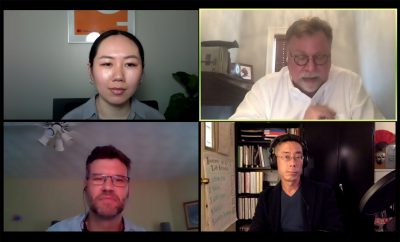When classes often rely on group performances, remote instruction becomes much more difficult. With Boston University’s first hybrid semester nearly halfway over, College of Fine Arts professors reflected on the adjustments they made this year.

Gregory Melchor-Barz, professor and director of CFA’s School of Music, led an online webinar Wednesday titled “Critical moments in CFA: Interventions into pedagogy,” which examined how collegiate arts programs have changed since March.
Melchor-Barz opened the webinar by asking the three professors on the panel to share a specific classroom story that has defined or impacted their educational experience since the pandemic.
Joel Brandwine, an assistant professor in technical production, said the cancellation of the School of Theater’s shows hit some students harder than others, including a senior who was the technical director for one of the canceled shows.
Brandwine said he was at first dismissive toward the upset student because the production was school work and not a professional show, but then recognized that thinking this way meant he was “pushing” his sentiments on his students rather than allowing them to express their feelings to him.
“The reality is that I have been given lots of opportunities, so for me, that was just one opportunity that doesn’t matter and another one’s going to come along,” Brandwine said during the talk. “And for him, this was the opportunity, and that was taken away.”
For Brandwine, who graduated from CFA in 2001, the pandemic and renewed attention to racial turmoil in the United States became a moment of clarity for him on how he could better understand his students.
His drafting and set design courses have adjusted to the Learn from Anywhere model, which he said has been helping with communication but blurs the line between work and free time.
“Everyone is so available at all times for face-to-face communication,” Brandwine said, “and I find myself in Zoom meetings at 9 p.m. at night because it’s the one time that everyone happens to be available.”
Assistant professor Mary Yang, who teaches art and graphic design in the School of Visual Arts, said she became aware of her student’s mental health issues during the pandemic while many were at home and feeling isolated.
“Talking with some of the students, I learned how difficult it was for some of them to connect with their own work,” Yang said. “Some of them even felt paralyzed and did not want to make during this time and I just let that be. I said, ‘It’s okay, you don’t need to be making and there are other ways of learning and you don’t have to be producing all the time.’”
Yang said these conversations allowed her to reexamine tools and resources she was providing in her classroom, as well as how she communicates with and supports students through the COVID-19 pandemic. In an interview, Yang said much of productive learning requires hands-on, collaborative work in a physical environment.
“If some students are a little more shy and they don’t feel comfortable speaking out in person,” Yang said, “little things like chat features in the Zoom and talking on Slack, it gives different types of students different opportunities to engage in an online environment.”
Representing the School of Music was assistant music professor Kính Vu. Vu spoke about how attending a majority-white university has affected students on campus, both before and after the pandemic.
“Today, we’re locked in a struggle against anti-Asian sentiments, particularly around COVID, while working to become allies with our Black sisters and brothers in a fight for human rights for everyone,” Vu said. “The time seems to be ripe for a reconsideration of curriculum.”
This cultural moment will be definitive for the nation’s institutions, Yang said in an interview. Yang, who was new to the faculty in 2019, said these large-scale issues affecting the country are topics that are important to consider as a professor.
“That’s something I personally think a lot about just in terms of equity, diversity and inclusivity, Yang said in reference to BU’s racial structure, “both in the student population and also within the faculty and those structures in the school.”























































































































